John Voelker, poet laureate of Michigan’s Upper Peninsula, once observed that fly fishing is the most fun a person can have while standing upright. Well, although it’s not a smart career move to disagree with the revered author of Trout Magic and Trout Madness, I think his remark betrays a certain lack of imagination. Good taste forbids me from citing specific examples to support my position.
I am, however, willing to state for the record that fly fishing is the most fun a person can have when, by any objective yardstick, you are failing miserably. This is especially true of fly fishing for trout, which remains the heart, soul, and conscience of this sport that is relentlessly pushing back its frontiers. There are people who fly fish very ardently these days for muskellunge and even carp. (I can personally attest that while the former is drudgery—“Like pushing a car uphill with a rope,” in the words of an equally unimpressed friend—the latter is such a blast that you find yourself looking over your shoulder to see if the cops are coming.)
Trout tend to live in beautiful, unspoiled but not necessarily uncivilized places, places that are the way they are precisely because we don’t get to visit them very often. So when we do find ourselves in trout country, feeling the cool press of the current against our thighs and the velvety summer breeze on our cheek, it’s hard not to be happy. It’s been said before but you don’t—or shouldn’t—need to catch trout in order to enjoy fishing for them.
I offer myself as Exhibit A. If catching trout were all there is to it, I’d never return to the Bois Brule, which despite its glamorous patina—the “River of Presidents” and all that—is a damn tough nut to crack. This cryptic quality is probably what made it so attractive to James Jesus Angleton, the master spook and poster child for paranoia who, when he wasn’t trying to ferret out imagined KGB moles from the middens of the CIA, retreated to his place on the Brule to match wits with its big, night-feeding browns.
Several years ago, a friend of mine caught 13 browns there in a single frenzied evening while I struggled to catch two. Our guide, Tom Heffernan—Dennis Miller in a Borsalino hat—sent me a Christmas card that read, “Dear Tom: The trout of the Brule are anxiously awaiting your return…because they know they have nothing to worry about!”
More Like This
So much for a tip the next time we fish together, you gin-swilling rotter.
Then there was the afternoon in early June when Winston Ostrow and I hiked in to fish a choice section of the Wolf, another “classic” Wisconsin stream. The portents couldn’t have been more favorable. The temperature and level of the water were perfect (“It sounds right,” Winston observed), there were no other anglers to compete with, and there was a veritable blizzard of insect activity, a Hendrickson spinner fall commingled with a gradually intensifying hatch of Sulfurs.
Neither of us caught a trout, which isn’t exactly front page news. What was remarkable, though, is that we didn’t see so much as a single feeble rise. Not one! Given the conditions, the Wolf River should have been transformed into the proverbial boiling cauldron of feeding trout. We could only surmise that we had offended the gods, impure thoughts being something of a specialty of ours.
So trout fishing can be a little frustrating. But you know what? It’s never, ever disappointing. Trout water, by its very nature, buoys your spirits, and whether I’m floating an Elkhair Caddis along a foam line or swimming a Pass Lake through a shadowed, swirling pool I remain resolutely optimistic about my chances for a hookup.
Plus, the sport takes you to lovely places with fine friends, and if the fish choose to make themselves scarce there’s never a shortage of satellite rewards. The elemental throb of a drumming grouse, like the living echo of your own heartbeat; a tiny saw-whet owl staring quizzically from a nearby limb, as if it were a bemused woodland sage; an exquisite pink lady’s-slipper in blushing full bloom against a backdrop of snowy white trilliums; a black bear ambling loose-limbedly down a sand road, looking for all the world like a kid who’s in no hurry to get home from school: These are not things you are likely to experience while jockeying a desk.
Nor are you likely to shiver with excitement at the thunder of whitewater, or cock your head to hear the sly, secret murmuring of a meadow stream that slips between its banks as frictionlessly as Naomi Campbell used to glide down runways. And you’ll certainly not feel the sweet thrill of making a perfect cast, or know the comprehensive satisfaction of presenting a fly as artfully as it can be presented—to name just a few of the reasons why the worst day of trout fishing still beats the crap out of the best day in the office.
A related truth—sort of a corollary to the basic Voelkerian premise—is that you don’t have to be very good at it to have a great time doing it. This capacity to be at peace with your mediocrity is high on the list of secrets to happiness. It’s also a sure sign of advanced age and diminished ambition, the sum of which frequently passes for wisdom.
One of my ideas of heaven is wading a boisterous northern freestoner, casting to my heart’s content, and not having to worry much about making fine entomological distinctions. (“Just as I suspected, Watson: A masking hatch of caddis!”) I probably won’t catch the most trout, or the biggest, but at the end of the day, when the waders are hanging from their pegs on the screen porch and sweat is beading on our bottles of beer, I promise I’ll be wearing as broad a smile as anyone.
For one thing, chances are good that I’ll have spotted an eagle carving through the forest-framed slice of sky above the river, or maybe spied a mink, its movements as fluid as the current itself, as it scampered across the glistening streamside stones. Images like this—along with the Zen-like moments of absolute clarity that seem to occur in the presence of wild things and moving water—are why you never “catch nothing.”
With so much of our lives in this frantic, hyperconnected age so utterly beyond our control, I’m more and more inclined to believe that simply being there is reward enough.

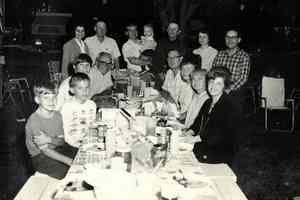

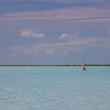
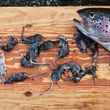

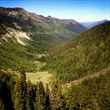
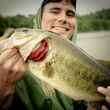



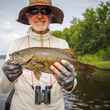
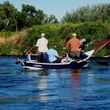


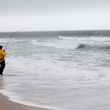
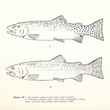



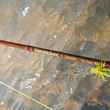
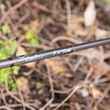



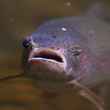
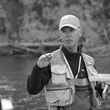

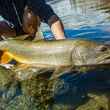
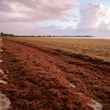
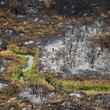
Comments
NorthCoastSteel replied on Permalink
I agree on several points. Trout fishing can certainly be frustrating, but you are right. It is never disappointing. I have yet to experience a day on the river without out something to talk about after. The best way I can explain trout fishing to my wife, who once confused a rabbit for a cougar, is that trout fishing is a relationship. You have to put forth an effort, you have to respect it and grow to love it! You do those things, and you won't waste another day on the river.
I like the UP and Brule references; both hit me in the heart. To others, don't forget about the trout streams of the northern midwest, they rival any.
Rlarscheid replied on Permalink
It's fun to read an article with local flavor, nice work!
Thanks from GB
Ross Slayton replied on Permalink
As a small time boutique fly tyer I have always tyed to do simply what you stated, solve a problem. I have never tyed a fly to drive sales, if the pattern works is the deciding factor, I leave pretty and eye catchin to my steelhead flies
Pages